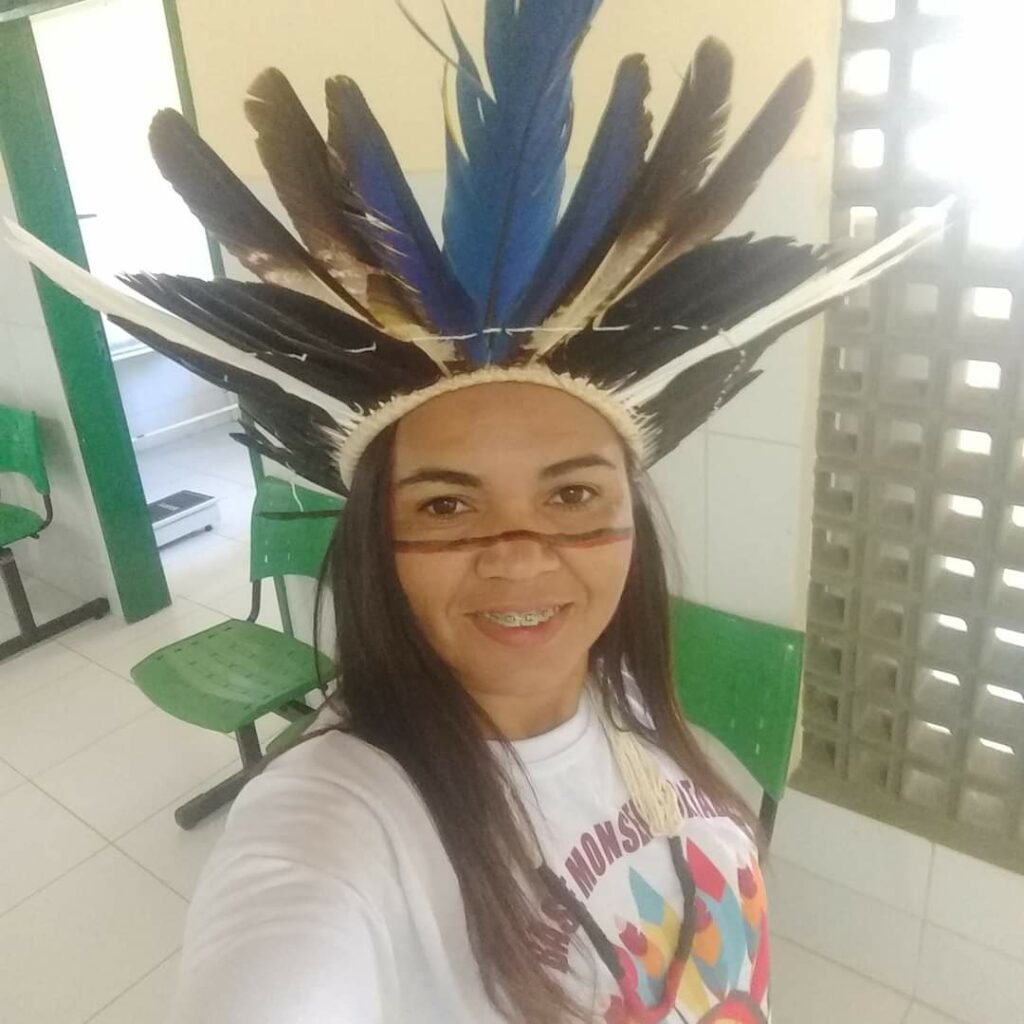Researcher: Daniela Alves de Araújo
Interviewee: Toinha Potyguara
Date: 21/09/2020

My name is Antônia Santos do Nascimento, I am known as Toinha Potyguara, I am 36 and belong to the Potyguara people of the Jucás village, which is on the outskirts of the municipality of Monsenhor Tabosa, in Ceará state. In my village, there were and continue to be Covid-19 cases. The protocols we adopted, as a village and as a health clinic, were to erect sanitary barriers at the entrance to the city, because we live on the outskirts; to use gel alcohol and masks; and make everyone aware that Covid-19 is invisible. Our village also took the precaution to ask relatives, who are very fond of visiting other relatives, to stay at home more, and if they have to go out, to use masks and protect themselves; since we have a village with many people with high blood pressure, diabetes and other pathologies, which are the major risk groups, as well as children.
For me, as an Indigenous health agent (AIS), it’s been a worrisome period, because at no time did those of us in health services stop working. We are working on foot, and making home visits. We don’t enter homes, but we never fail to provide assistance to our children and the hypertensives, always making people aware. At some critical moments, we had to work via cell phone. We often work via WhatsApp, and social networks. It is, therefore, not an easy time, not just for us, in the Jucas village, but I think for the world. At one point, we were the city with the least cases (in the region), but now community transmission is occurring, we no longer know where the disease is; we are experiencing a very critical moment. At my clinic, we had professionals who got infected, but, thank God, we are fighting this virus.
In some manner, like it or not, we were affected, I felt affected. We continue to fight today. Thank God, up to this very moment, my prevention to not contract this virus is working. It’s scary, because it’s a disease that is sometimes lethal. I lost someone very important to me, my cousin, my work partner, an Indigenous health agent from the village of Grota Verde, who helped its families very much. She was unable to resist Covid-19 and died. I also lost some friends. This pandemic, for us, Indigenous people, has caused a great loss, we are the people who have been most affected. Every day, we are knocking on the door of each relative and asking them to stay home, to go out only if it’s really necessary. However, work for us is not easy. It’s a difficult moment, it’s very difficult, but we are fighting. May father Tupã bless us and protect us in this very difficult moment, when we don’t know where the disease is.
Today, our city is badly affected; at one time, it wasn’t. Many of our relatives here are already affected, we have already lost some. At my health clinic, we have three areas and I belong to area 1. Today, we have 26 infected Indigenous people, and we are still waiting for some results. We are fighting and some people have been cured. However, for us, it’s all still very new. As Indigenous health agents, psychologically, we are upset. In addition to being a professional, I am a mother, a parent, and a friend, so I ask people to stay at home and only go out if it’s really necessary.
Interviewee: Cleomar Pereira dos Santos
Date: 07/09/2020
Questionnaire:
- What is your name?
- How old are you?
- Who are your people? What is your village and municipality?
- In your village, were there any cases of Covid-19?
- What safety protocols did the village adopt?
- How was it for you, an Indigenous person, to live through this very difficult moment?
- Were you affected in any way? If so, what were the main impacts?
- Did you lose a relative or someone you know to Covid-19?
Answers:
1 – My name is Cleomar Pereira dos Santos.
2 – I am 42 years old.
3 – I am Potyguara from the village of Tourão, in the municipality of Monsenhor Tabosa in Ceará state.
4 – In our village there were no cases of Covid-19, thank God.
5 – The protocol that we tried to establish here in the village is to raise people’s awareness not to leave their homes; not to go into the city, unless it was necessary; use masks, gel alcohol, and when they arrive from the city, to sanitize everything, remove the clothes used in the city, change into others, and wash those separately, because they could carry the virus. Every time someone goes to the city, we are aware of it. Mask use is constant, but there are those who are more stubborn, who don’t want to use masks or gel alcohol. So then we start talking diplomatically until we manage to raise the awareness of these people. It’s difficult, but we do our part.
6 and 7 – Living through this moment has been very difficult for us. It is something that caught us by surprise, because it is a virus for which there is no remedy and no vaccine. It was very difficult, especially for me, as a health agent. Many times, we would ask people to use masks and they expressed ignorant attitudes. People lacked understanding. This was the most difficult period I’ve ever encountered in my whole life.
8 – Yes, I lost a friend. She was a health agent on our team. For us, it was a great loss, a very sweet, much beloved person, and Covid-19 took our friend from this world to the next. Her name is Daniela; she was also a health agent in our area.